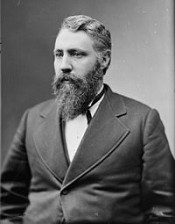Keifer Joseph Warren

Joseph Warren Keifer (January 30, 1836 – April 22, 1932) was a brigadier general in the Union Army during the American Civil War and a prominent U.S. politician during the 1880s. He served in the United States House of Representatives as a Republican from Ohio from 1877 to 1885 and from 1905 to 1911. From 1881 to 1883, he was also Speaker of the House. Keifer was born in Clark County, Ohio. He attended school at Antioch College then returned to his family's farm. While working as a farmer he devoted his spare time to studying law. He began his law practice in Springfield, Ohio, January 12, 1858. He enlisted in the 3rd Ohio Infantry, a three-months regiment, being appointed major. He served in western Virginia fighting in the battles of Rich Mountain and Cheat Mountain and afterward was promoted to lieutenant colonel of the regiment. When his term expired, he joined the 110th Ohio Infantry and became its colonel. He served in the Eastern Theater leading his regiment at the second battle of Winchester. While the Union army was soundly defeated and most of it surrendered, Keifer's regiment was able to avoid capture. Following the battle of Gettysburg Keifer was assigned to brigade command in the III Corps and fought at the battle of Wapping Heights. After Robert E. Lee's army had retreated to safety in Virginia, Keifer and his regiment were dispatched to New York City to help suppress the draft riots. Keifer returned to the Army of the Potomac in time for the Overland Campaign. He was wounded in the arm at the battle of the Wilderness, putting him out of action for a time. When he did return to active duty he was placed in command of the 2nd Brigade in James B. Ricketts' 3rd Division of the VI Corps. He led his brigade at the battles of Winchester and Fisher's Hill. During the battle of Cedar Creek, VI Corps commander, Horatio G. Wright temporarily commanded the Army of the Shenandoah and Rickets temporarily in command of the corps. This put Keifer in command of the 3rd Division in Ricketts' absence. When Philip H. Sheridan heroically returned to command the army in the midst of the battle, returning Wright to corps command, Ricketts had already been wounded leaving Keifer in command of the division for the rest of the battle. For his service during the Shenandoah Valley campaign he was brevetted brigadier general of volunteers on October 19, 1864. When the VI Corps returned to the Army of the Potomac General Truman Seymour was placed in command of the 3rd Division and Keifer returned to command the 2nd Brigade, taking part in the breakthrough at Petersburg and the Appomattox Campaign. Following the war, Keifer returned to Springfield and resumed his law practice. From 1873 until his death, he served as a trustee of Antioch College. In 1876 he was a delegate to the Republican National Convention and the next year went to Congress. From 1881 to 1883, he was Speaker of the House. Later he was involved in the Spanish American War as a major general of volunteers. Late in his life, he served as the President of the Lagonda National Bank in Springfield. Keifer is buried in the Ferncliff Cemetery in Springfield, Ohio.
do you like this author?
What readers are saying
What do you think? Write your own comment on this book!
write a commentWhat readers are saying
What do you think? Write your own comment on this author!
write a commentBook list

Slavery and Four Years of War,Vol. 1-2A Political History of Slavery in the United States TogetherWith a Narrative of the Campaigns and Battles of the CivilWar In Which the Author Took Part: 1861-1865
Series:
Unknown
Year:
Unknown
Raiting:
5/5
Show more
add to favoritesadd In favorites

speeches in part of hon j warren keifer of ohio in the house of representa
Series:
Unknown
Year:
Unknown
Raiting:
2.5/5
Show more
add to favoritesadd In favorites
Book list

Slavery and Four Years of War,Vol. 1-2A Political History of Slavery in the United States TogetherWith a Narrative of the Campaigns and Battles of the CivilWar In Which the Author Took Part: 1861-1865
Series:
Unknown
Year:
Unknown
Raiting:
5/5
Show more
add to favoritesadd In favorites

speeches in part of hon j warren keifer of ohio in the house of representa
Series:
Unknown
Year:
Unknown
Raiting:
2.5/5
Show more
add to favoritesadd In favorites

oration at the unveiling of the statue of james a garfield washington dc m
Series:
Unknown
Year:
Unknown
Raiting:
2.5/5
Show more
add to favoritesadd In favorites

official reports of j warren keifer brevet major general of volunteers u s
Series:
Unknown
Year:
Unknown
Raiting:
4.5/5
Show more
add to favoritesadd In favorites

Slavery and Four Years of War, Vol. 1-2
Series:
Unknown
Year:
Unknown
Raiting:
3.5/5
"Excerpt from the book..."war campaigns cover the first one in Western Virginia, 1861;others in Kentucky, Tennessee, Mississippi, and Alabama, 1862; inWest Virginia, Virginia, Maryland, and Pennsylvania, 1863; and inVirginia, 1864; ending with the capture of Richmond and Petersburg,the battles of Five Forks and Sailor's Creek, and the surrender ofLee to Grant at Appomattox
Show more
add to favoritesadd In favorites
What readers are saying
What do you think? Write your own comment on this author!
write a commentif you like Keifer Joseph Warren try:
readers also enjoyed
What readers are saying
What do you think? Write your own comment on this author!
write a commentGenre
if you like Keifer Joseph Warren try:
readers also enjoyed
Do you want to exchange books? It’s EASY!
Get registered and find other users who want to give their favourite books to good hands!

